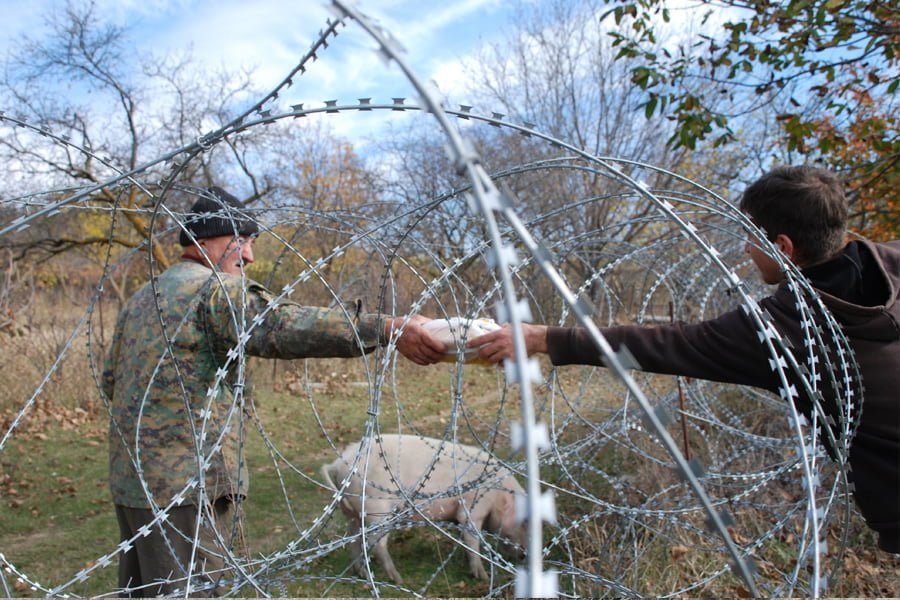Kokoity vs. Tibilov: An irrelevant standoff
On 4 March, the Central Electoral Commission (CEC) of South Ossetia refused to register Kokoity as a candidate since for the past five years he didn’t permanently live in South Ossetia. On 9 March, Kokoity’s supporters took the case to the republic’s Supreme Court.
On 11 March, Kokoity led a rally during which he lambasted Vladimir Putin’s aide on Abkhazia, South Ossetia, and Ukraine, Vladislav Surkov.
‘We stand with Russia. We stand with Putin. And we won’t allow such crooks like Surkov to substitute Putin. Neither in Donetsk, Luhansk, nor especially in South Ossetia’, Kokoity told the crowd and accused Surkov of behaving as if he was South Ossetia’s ‘landlord’.
On 13 March, a day before the decision of the Supreme Court was announced, several dozen of Kokoity’s supporters rallied in front of the Court. The protesters argued that the Court took longer than statutory three days to consider the case. The Court eventually upheld CEC’s decision, once for all disqualifying Kokoity from the elections.
Kokoity has since declared that the documents demonstrating the period of his stay outside South Ossetia were falsified and launched a campaign calling for the incumbent president, Leonid Tibilov to resign. Kokoity’s protests have sparked counter-protests from Tibilov’s supporters.
In this standoff the former president is in a losing position.
The Surkov consternation
It’s not a mystery that South Ossetian politics are tightly connected with — if not fully controlled by — the Kremlin.
Due to the overall secrecy surrounding the Russian–South Ossetian relations, foreign experts’ ability to assess the extent of Surkov’s interference in South Ossetian politics is limited and largely speculative. The secrecy is perpetuated by local journalists — both South Ossetian and Russian state media ignored Kokoity’s statements about Surkov.
The incumbent president, Leonid Tibilov came to power in 2012 following the cancellation of 2011 presidential elections by South Ossetia’s Supreme Court. Those elections were won by independent candidate Alla Dzhioyeva, who was subsequently accused of electoral fraud and barred from participating in the 2012 rerun — with tacit support and acknowledgment from Russia.
Leonid Tibilov has subsequently been accused of installing current Prime Minister Domenti Kulumbegov, who was responsible for replacing several key ministers, under direct orders from Vladimir Surkov.
One hint about where the Kremlin’s alliances lie can come from the 2016 report prepared by a Russian think tank with close ties to Vladimir Surkov. In the context of upcoming elections, the report calls Kokoity ‘a political outsider’ and notes that neither Moscow nor Tibilov and Bibilov are interested in his return to South Ossetian politics. Similarly, Caucasian Knot quoted an unnamed member of President Tibilov’s administration, who said that Moscow wouldn’t support Kokoity.
Many South Ossetian social media users interpreted Putin’s good luck wishes to Tibilov as an indication of support tantamount to designation. Following Tibilov’s meeting with Putin on 21 March, Tibilov claimed that he received ‘full approval on all issues discussed’.
Unification with Russia has been endorsed with a varying degree of enthusiasm by two leaders of the current presidential race — President Leonid Tibilov and Speaker of the Parliament Anatoly Bibilov. Bibilov’s party, United Ossetia, has long advocated the idea of unification, while in late 2015, Tibilov, arguably trying to weaken his political opponent by capitalising on this popular sentiment, announced a referendum on the matter. Virtually all South Ossetian political forces expressed support for the initiative, with the debate focused on the timeframe of the unification process.
In May 2016, Tibilov and Bibilov reached an agreement saying that the referendum wouldn’t be held until the 2017 presidential elections — a development which might be connected to Russia’s unreadiness or unwillingness to annex South Ossetia, at least at this very moment.
Kokoity, on the contrary, has showed himself as a supporter of South Ossetia’s nominal independence. In November 2016, he told Interfaks that ‘a person who will strengthen the country’s independence and broaden the strategic partnership with Russia should become the president’.
At the same time, Kokoity remains largely unpopular among South Ossetian voters due to the accusations of corruption and misspending.
North Ossetian news outlet Iron Times reported that in Tskhinvali it was difficult to find open supporters of Kokoity and voicing one’s dislike of him was now a matter of a ‘good tone’. Similarly, an ad hoc monitoring of South Ossetian social media groups revealed an overwhelming criticism of Kokoity — even despite occasional opinions agreeing with his statement on Surkov de facto controlling the republic. Many social media users accuse Kokoity of fomenting discord in the republic by disregarding the verdict of the Supreme Court, which sets a dangerous precedent of ‘undermining democratic institutions’.
Still, one Facebook user questioned the independence of the Supreme Court by pointing out that its chair Ilona Khugayeva was appointed by President Tibilov in December 2012.
